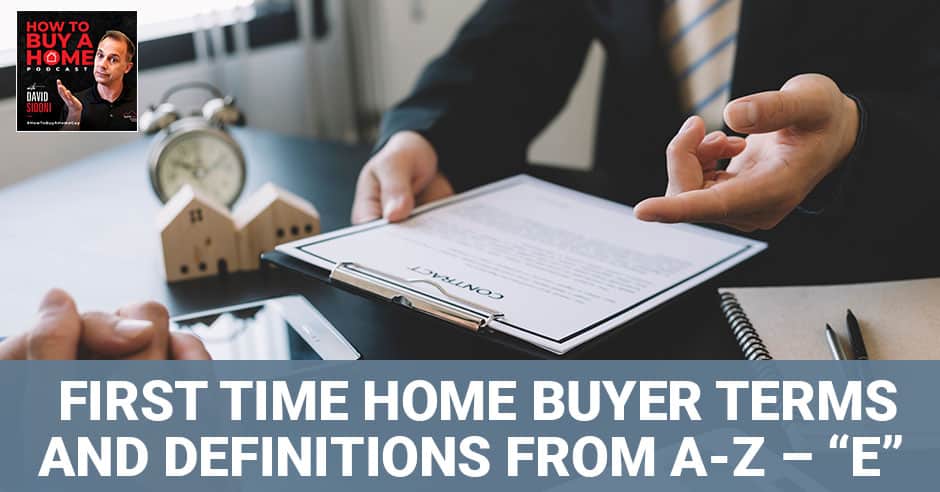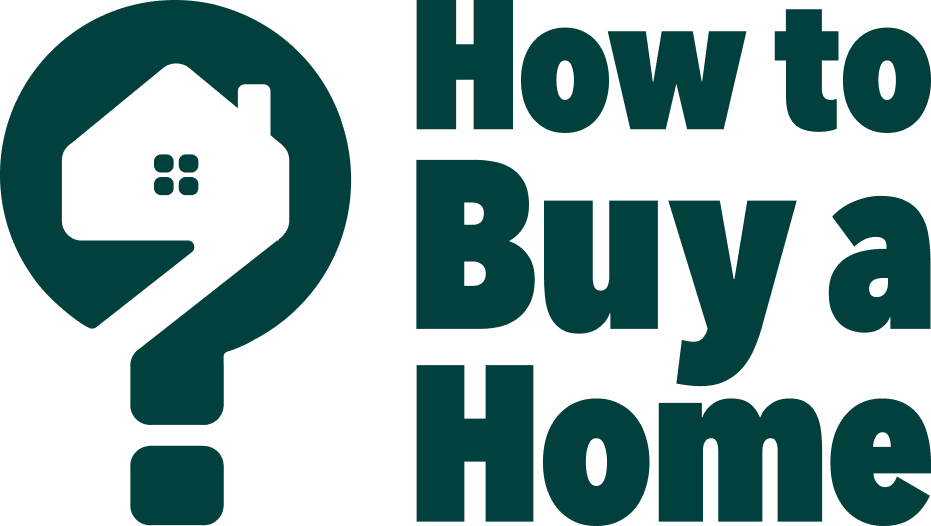
Trudging through the alphabet to help crush the confusion in the whole first-time buyer home buying process, David Sidoni tackles the mysterious real estate terms and definitions beginning with the letter “E” to help bring some much needed clarity to the process.
—
First Time Home Buyer Terms And Definitions from A-Z – “E”
Everything You Need To Know About Buying Your First House From A-Z
This is our 99th episode. In honor of Wayne Gretzky, I am going to do the E episode of real estate terms and definitions. There is a logic behind this. It’s not only because it is 99, but also because his name is one of the most misspelled famous last names ever. There are letters, misspellings, and not to mention the fact that the letter E is the only letter that happens twice in his full name. That is it. Episode 99 for the great one. Let’s go.
—
What is going down, How to Buy A Homies? How are you living? Are you ready to keep fighting the good fight? Are you ready to get into some real estate vocabulary? What is more exciting than that? This has been on my cannot wait list. Let’s get into it. The first E real estate term is the EMD. It is the Earnest Money Deposit. It is not an abbreviation for a hip-hop artist, even though it sounds like to me every time I say it. This is sometimes referred to as the good faith deposit. The EMD is a real important part of the real estate transaction. It is the initial funds that a buyer is asked to bring into the deal and put down once the seller accepts your offer real quickly.
It can vary from 1% to 5%, depending on where you live. You have to have that money before you get the rest of your money in, which usually is not due until the end of the transaction. That is why we got to be prepared for this EMD. Here in Cali, there is a 3% maximum. You cannot get your offer accepted by coming in and saying, “I want to put 10% down from my earnest money deposit.” You might put more down later, but putting it down upfront does not necessarily mean that your offer is going to get accepted because the seller in California can only recoup 3% of the earnest money deposit if you bail on the deal and you break the contract.
That is the max, and that is all that matters. The deposit funds are held by a third party. They are called, depending on where you are at, an escrow company, a closing company, or a title company. When that earnest money deposit comes in, it will get cashed immediately or wired or deposited. That gets cashed and deposited, even though the funds cannot be released until both parties agree to do that, to release it per the conditions of the contract or the purchase and sale contract. When the home sale is finalized or closed, the earnest money gets applied to the closing costs or usually gets applied to the down payment because you figure you are putting 1%, 2%, or 3%. If you are putting 3%, 5%, or 10%, that is the beginning of your down payment.
This EMD is to show that you are committed to buying the home. It shows that the buyer is serious about buying but is also willing to put their money where their mouth is. In this case, you are not putting the money where your mouth is because you are backing up your talking. You did not talk. You emailed the offer. It means that you are willing to put your money where your IP address is. Here is the deal about the EMD that everyone asks me about. The deposit will not be refunded to you after the seller accepts your offer unless one of the sales contract contingencies is not fulfilled or if the contract is terminated for a permissible reason.
The main thing people ask me all the time is, “I put this deposit in. What happens now?” Technically and contractually, you can get your money back. You have that contingency condition due diligence period. If you decide that you do not want to move forward with the sale, you should be able to get your money back. This is very important for you to realize you, as the buyer, have the right to get your EMD back per the contract. However, it is always subject to the contracts to ensure that you, your realtor, your representative, your advocate, and your unicorn have everything all worked out for you.
The reason I tell you that is because I get a lot of first-time buyers that fear that sending this money in is going to be something that they are going to lose, and they have no recourse to recoup the money should they discover some things that upset them during that period. This is precisely why it is an earnest money deposit. It is also precisely why it is held by a neutral third party. Neutral is our favorite word in real estate. It is not turned over immediately to the seller. Your check gets cashed, but not them. It is by a neutral third party.
[bctt tweet=”Stand up for yourself. Housing is a right for every person.” via=”no”]
This is for the seller to know that you are serious, but the seller also realizes this is held with conditions and regulations that are set by that neutral third party. That is there to protect you and your ability to thoroughly inspect the property per the terms, the guidelines, and the timelines of the contract. You got it. If you want to buy a house, you got to put up or shut up. In most cases, if everything is going correctly and the deal does not work out, you should be able to get your money back.
The next E term is an Easement. That is the right to use or access the land you own by somebody else. It sounds weird, but you would be surprised how many parcels of land have easements. Lots of times, it is for utility or government entities to allow access for the public good. Sometimes they have to be able to get to something or get through something. A lot of times, you are going to hear easement between a couple of neighbors. Sometimes there is an easier way to access a property if you can sneak over on the other guy’s land for a little bit.
Our next E word is Employer Assisted Housing. This is an actual real estate definition. I do not know where in the world this happens. Supposedly, it is a program where the companies assist their employees and purchasing homes by providing assistance with the down payment, closing costs, or monthly payments. A lot of times, this does happen in a relocation situation. If you are moving from one place to another and the boss is like, “I got to pick you up and move you from Miami Beach to Toledo. Here is what I am going to do. I am going to pay for your closing costs.” It is a thing.
The next E word is Encroachment. Encroachment gets confused so often. I want to make sure I explain this to you thoroughly. Encroachment is where the defensive player touches the offensive player before the ball snap. Offside is when the player lines up over the line of scrimmage. I will explain what a neutral zone infraction is when we get to the ends. In real estate, an encroachment is an intrusion onto another property without the right or permission. It is way more exciting football. Encumbrance is anything or any claim that affects the title of the property, such as a lien, a mortgage, an easement, or a restriction. Your mortgage on your property is an encumbrance.
This is a cool one. It is an Energy Efficient Mortgage known as an EEM. This FHA program helps homebuyers save money on utility bills by enabling them to finance the cost of adding energy-efficient features. Whether it is to new homes or existing homes, as part of the home purchase, you can finance it as part of your loan. Here is the deal. It sounds exciting, but these things come and go depending on the lender guidelines. Check with your lender while you are in your planning stages to see if there are any good EEMs you can take advantage of.

The next E is the Equal Credit Opportunity Act. This is a Federal Law that requires lenders to make credit equally available without regard to the applicant’s color, religion, national origin, age, sex, or marital status. This is also important. It also cannot let you discriminate if part or all of the applicant’s income is derived from a public assistance program. The final thing that it protects against is the fact that if the applicant has, in good faith, exercised any right under the Consumer Credit Protection Act. Throughout your transaction, you are also going to get a whole bunch of paperwork on it. It is like those things you see at work that like tell you all the equal laws and employment acts. Imagine the paper version of that. It is going to come in your pile and mountain of paperwork that you get when you buy your home. This ECOA is also sometimes called Regulation B.
I saw a poll come out in first-time home buyers. They were trying to figure out, “What is the biggest obstacle to new home buyers?” The biggest obstacle was the affordability and the rising interest rates and inflation. The second biggest obstacle that these first-time home buyers and home buyers in general said when they were asked the question was discrimination. That sucks. I want you to make sure you guys know your rights. You know me. I am going to fight for you. Your realtor and lender should fight for you too. Get yourself a unicorn team with your best interest in mind and get treated right.
If you are working with someone and you are not feeling it or if someone is discriminating against you, go to HowToBuyAHome.com and get a unicorn because if I ever hear of a unicorn discriminating based on race, sexual orientation, disability, religion, color, marital status, or your taste music, they will be stripped of their unicorn status. I will send all of my musical theater and friends to see show tunes outside their office while dressed in the native costumes of their ancestry. I am not having it. Neither should you. Stand up for yourself. Housing is right for every person.
Our next E term is Equity. Speaking of theater, that is the actors union for Broadway performers. In real estate, equity is as fierce and sparkles just as much. Equity is your profit. It is your home value above the total amount of the liens against your home. Equity is your net ownership. I talk about gross a lot. Now I am going to talk about the net. In other words, it is the difference between how much your property is worth and how much you still owe on your mortgage. It is the market value minus the mortgage balance that equals equity.
Your mortgage is a lien. You got to subtract your lien. If you put 5% down on a $400,000 home, you owe $380,000. You have $20,000 in equity. If the home goes up another 5% in market value, you now have $40,000 in equity, but you only put $20,000 in. Plus, we are going to add on top of that any of the principal that you paid off in your mortgage payments.
The next E term can be one of the most frustrating E terms in all our real estate because it is like Aloha. It can mean eight different things. The term is Escrow. For example, in California, escrow is the company that handles your transaction and the closing. They are the third party between the seller and the buyer. In other states, different parties are what is known as the escrow holder. It is the same thing. It is the impartial third party who collects the money, written instruments, documents, personal property, or other things of value that are to be held by one person until the contracted happening of specified events. That is a real real estate term, the happening of specified events.
[bctt tweet=”Do not expect instant gratification on your journey to buying a home. This is a marathon, not a sprint. You got to find ways to stay enthusiastic and pumped. Keep your eyes on the prize and keep yourself motivated throughout the process.” via=”no”]
The escrow is the middle person. I describe to all my first-time homebuyers that the escrow is a bucket. That is in California. It is called something else in some places, but in California, we have an escrow company, and they are a bucket. Everyone throws everything into the bucket. If we all agree on things, that company takes the bucket, pulls everything out, and hands it to everybody who is supposed to get it.
To make things more confusing, when you are under contract in an escrow state like Cali, now you are in an escrow. You are in escrow with the escrow company. To keep the confusion coming, your mortgage payments, you can set up an escrow account when you set them up. That is set up by your mortgage lender to pay certain property-related expenses like your property taxes and homeowners insurance.
Sometimes it is referred to as an impound or reserve account. I talk to you about PITI, Principal, Interest, Taxes, and Insurance. That is the full number of things that make up your monthly payment. What it does is open an escrow account for you. There is the P and I. They take that money. That is theirs. T and the I are Taxes and Insurance. They are going to open an escrow account for that. What they do is they are going to keep that and then pay them when the time comes to pay it. If you decide to do an escrow account with your lender and create that impound account, you get an escrow analysis. Another escrow term is where they do the accounting by the mortgage servicer.
What they do is determine the appropriate balances that you need to keep in the escrow account. When those bills come due, you know how much you need to pay for them. From that escrow analysis, they compute your monthly T and the I in the PITI and determine if you have any surpluses or deficiencies. That is your escrow fun.
The next E word is something that I hope not a lot of you know about, but you have probably heard about it. It is Eviction. It is the legal act of removing somebody from a property. We are getting down to the selling side of real estate, something for you to keep in mind for later on. When you are selling a home, there are two ways to do it, the exclusive right to sell listing. There are two main types.
How the seller chooses to do it and the exclusive right to sell is the traditional way that most listing agreements happen. That is where the property owner appoints a real estate broker oftentimes known as the listing broker or listing agent, as the exclusive agent to sell the property on the stated terms, and they agree to pay the listing broker a commission when the property is sold, regardless of whether the broker or another broker finds the buyer.

The other kind is exclusive agency listing. That is an agreement where the real estate broker acts as the exclusive agent to sell the property for the owner but may be paid a reduced commission when the property is sold if, for example, the property owner, rather than the listing agent, finds the buyer. This usually means that the person doing the listing is going to provide a limited range of services rather than the traditional full range.
Our next E word is Executer. To me, that is the dude in the hoodie, usually shirtless with the big ax, but it is also the person named in the will and approved by the probate court to administer the deposition of the estate in accordance with the instructions of the will. They are in charge of divvying everything out according to the will. This is the definition episode. There is not going to be a lot here because it is a vowel. There are only two more E words left, but before I go and give you those last two, or if you are getting some good value or maybe getting some good sleep-inducing with these definitions or are getting anything out of this, write a review up on Apple Podcasts or Spotify.
Googling all this crap and taking hours of your time, I do this for you. Hopefully, you could tell other people, “Do not look all of this stuff up. There is this crazy old bald dude in California who did it for you.” Most of the real estate industry is not spending the time to help you figure out how all this affects you and help you make sense of this all. The more you review and share, the more people I can help out to come out of the dark and into the light. Also, make sure you follow me on TikTok @HowToBuyAHome. I am there. @DavidSidoni is on Instagram, and be sure to check out the How to Buy a Home Podcast on YouTube.
There are two last important E words. The first one is Electric, as in Electric Boogaloo from Breakin’ 2, the sequel to the classic 1984 movie Breakin’. Both are must-see films. Finally, the last E word is Enthusiastic. You need to seem enthusiastic when you are going through the process of buying a home, especially if you are reading this sometime in 2022.
Do not expect instant gratification on your journey to buying a home. This is a marathon. This is not a sprint. You got to find ways to stay enthusiastic, stay pumped, keep your eyes on the prize, and keep yourself motivated all the way throughout the process. This is your time. This is for you. With some simple steps, you can get some gigantic results. Stay fired up. Are you fired up? I am. Do you know why? I have seen this movie before, and I know the ending. I know you can do this.
Important Links
- HowToBuyAHome.com
- Apple Podcasts – How to Buy a Home
- Spotify – How to Buy a Home
- @HowToBuyAHome – TikTok
- @DavidSidoni – Instagram
- How to Buy a Home Podcast – YouTube
This podcast was started for YOU, to demystify things for first time home buyers, and help crush the confusion. After helping first timers for over 13 years, I knew there wasn’t t a lot of clear, tangible, useable information out there on the internet, so I started this podcast. Help me spread the word to other people just like you, dying for answers. Tell your friends, family, and perhaps that random neighbor you REALLY want to move out about How to Buy a Home! A really easy way is to hit the share button and text it to your friends. Go for it, help someone out. And if you’re not already a regular listener, subscribe and get constant updates on the market. If you are a regular and learned something, help me help others – give the show a quick review in Apple Podcasts or wherever you get your podcasts, or write a review on Spotify. Let’s change the way the real estate industry treats you first time buyers, one buyer at a time, starting with you – and make sure your favorite people don’t get screwed by going into this HUGE step blind and confused. Viva la Unicorn Revolution!
Instagram @DavidSidoni
Tik Tok @howtobuyahome

